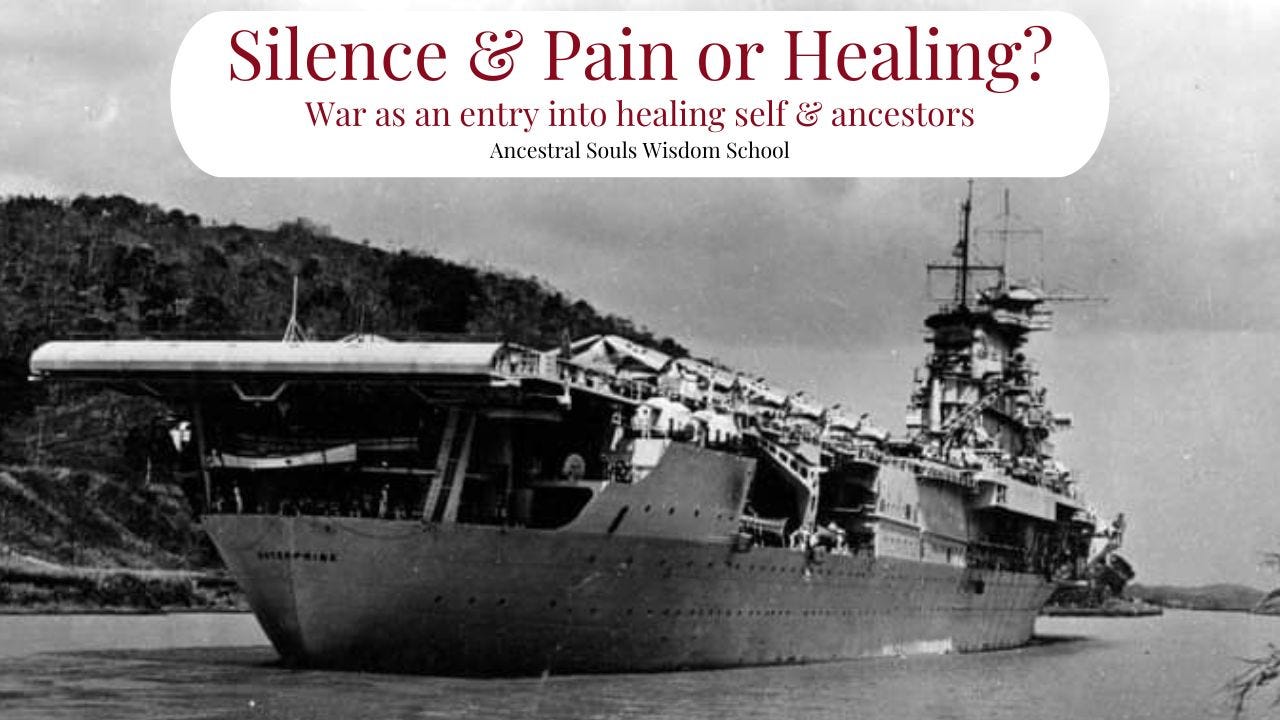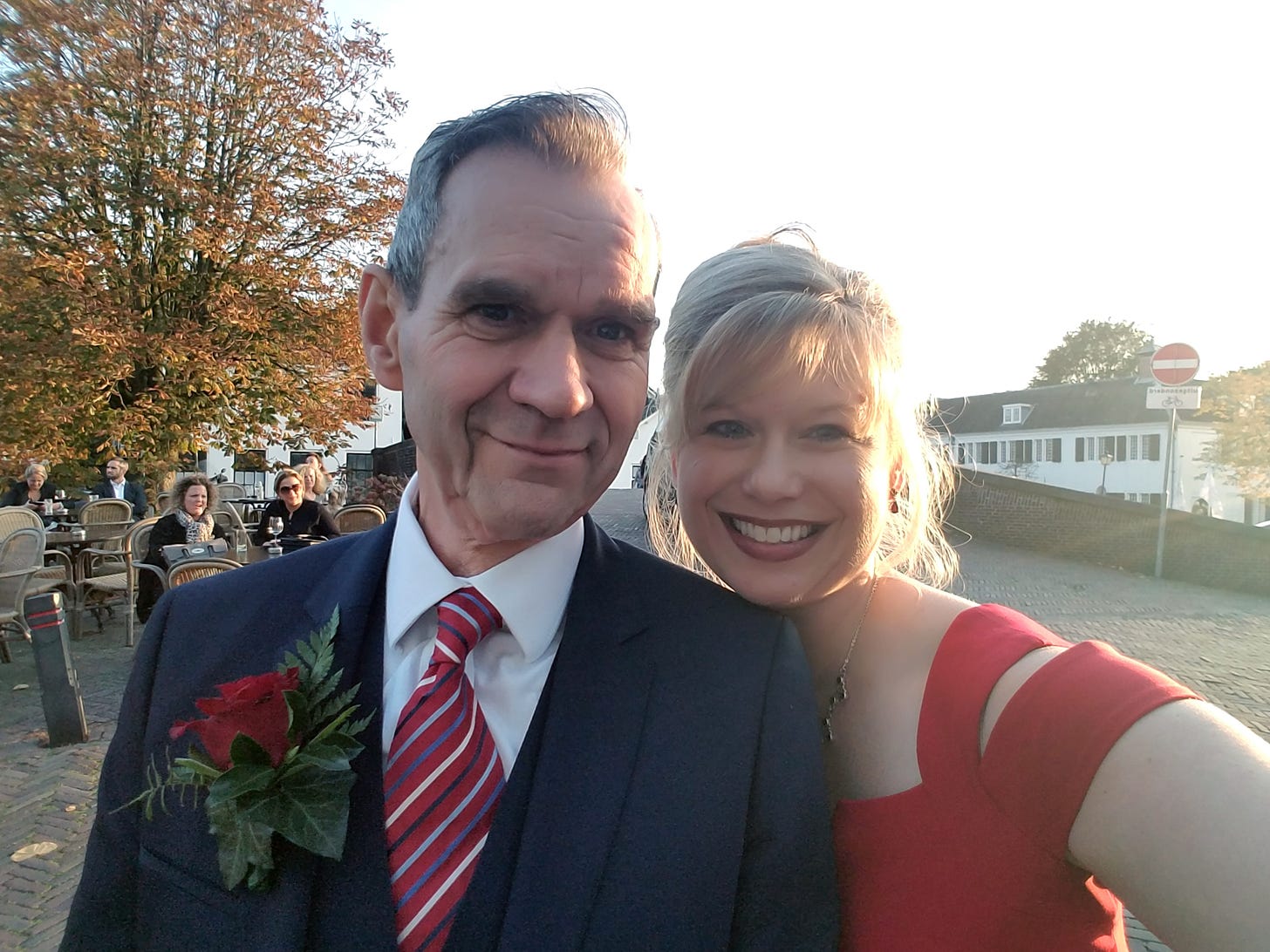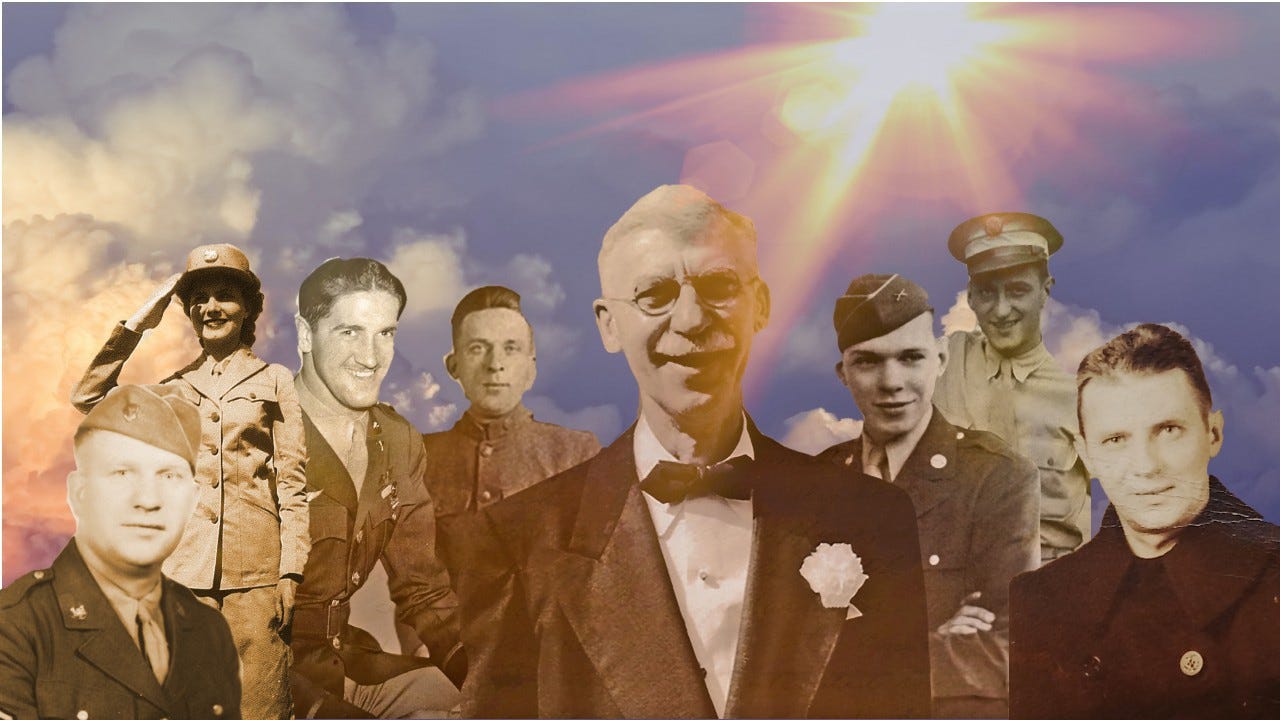I recently attended the Fox Valley Genealogical Society conference and heard a new speaker, Lauren Peightel present Breaking the Silence: Healing Family and Adding to One Sailor’s Story. In all honesty, she was the only reason I signed up for this conference. The other speakers had interesting topics but I went to hear her talk about her WWII grandfather’s story and the healing work she had done.
If you’ve followed me for any length of time, you know I have my own WWII grandpa story of war, generational trauma, and my healing journey along with my late Dutch husband Johan. Several articles on this topic can be found on my Substack. I wanted to hear how Lauren approached her research and healing journey because not many people are talking about this important topic.
You see, the genealogical community, from my observation of almost 30 years, along with the military research community, tends to focus on facts and paper trails. Emotions are nowhere to be found. The communities have been hesitant to focus on spiritual topics or healing for many reasons. Primarily because they feel you need a therapy degree to be talking about this and if you go all woo-woo and mention you talk to your dead ancestors, they label you as crazy. Everyone is allowed to believe whatever they choose. It’s not my job to convince anyone of anything but to provide my experiences, some facts, plant seeds, spread love and information.
So what did Lauren talk about in her program and how did it impact my work and life?
Lauren’s program was unlike any other I’ve ever attended at a conference or society meeting. For roughly 45 minutes she read a story to us about her experience and journey into war, healing, her family’s generational silence, her own PTSD, and how things are shifting. Her PowerPoint showed various slides with keywords and images to emphasize some of what she was telling us as she read. Her words were laced with heavy emotion and at times she was close to breaking down. As someone who shares brief snippets of my emotional war writing, and almost breaks down at times, I applaud her for being so raw and authentic. The world needs more of this example.
I took three pages of notes as she spoke. She used words and phrases I may not have but that mean the same things as what I say. I come to this work from a more spiritual perspective. I didn’t get the impression that Lauren came from this perspective, which is fine. We are not all the same and each of us is on our own path with our own family beliefs, religion, and cycles.
As I listened and wrote, I found similarities between Lauren’s entry into war, trauma, healing, and sharing and my own journey. War was as she stated, an entry point into opening up discussion, breaking the silence, and starting to heal. Lauren explained that not only do we need to do the research but we also need space to heal and explore the emotions that rise.
You see, without quiet space, the emotions, energy and trauma that is being pushed to the surface will not be allowed to process and release if we do not make the time and space to heal. Instead it will fester and grow more dangerous which will create more chaos in our lives. However, that quiet space which was born from forced or generationally programmed silence can hurt us. When we are taught to never mention something, keep secrets, hide the pain, pretend all is well and life is “normal”, it can create more illness, pain, and trauma in our lives as well as mess up the choices we make. Thus the patterns repeat until someone steps in to break the cycle.
As many of us who are on a spiritual path or healing journey have discovered, there is a lot of pain that accompanies our journey. In a way, it helps us awaken to our own beliefs, behaviors, patterns, choices, and traumas, as well as our ancestors’. Lauren had a series of traumatic events around family members during her life and especially the last few years. Much of it revolved around health. Once she put some of these puzzle pieces together, she was able to start shifting the energy and slowly heal.
Health, illness, death, or impending death and anticipated grief, can create a lot of chaos within us. Emotionally, mentally, physically and spiritually. Many of us on our journeys right now have faced this - within ourselves or family members and spouses. This is a major way I’ve witnessed many people start their healing journey.
I was no exception to this - Johan’s cancer diagnoses, treatment which sent him on a slow death spiral for years, my being a caregiver and living on two continents while still raising kids and running a business - all contributed to my journey. In the end it linked me to my WWII grandparent’s journey and trauma and Johan’s parents traumas - which I was living out with him.
How Long Does Healing Take?
From what I understood and interpreted, Lauren’s healing journey on a more conscious level seems to have begun right before or after 2020. In a few short years, she has uncovered a lot of information about her grandfather and the rest of her family. She said she still has a long way to go.
This is true for anyone on a healing journey. The layers have to be shown, processed, healed and released slowly or it only creates mass destruction in our lives. It’s like peeling an onion - one layer at a time.
My own journey began almost 30 years ago when I started researching my family history. Then after 2012 when I got my grandpa’s Navy file, the shock of his diagnosis and realization that my family lied to me about his life, has taken a while to process. That said, I am also aware that I had to have the relationship and two continent life experience with Johan in order to see it all and heal. Yet, even though he’s been dead 2.5 years, I’m still uncovering layers around his story, his parent’s WWII stories in Rotterdam, my grandparent’s experiences, and my own stuff.
Lauren expressed in her program that the information we need or people, will show up exactly when they are supposed to. This is true.
The Emotions of Research
For years, I have been inviting people to explore the emotions that rise with their research. To step off the paper trail from time to time to see what’s hidden. To allow space to process and heal. The family history or military work CAN HEAL US if we allow it. Lauren is allowing it.
For myself, when I wrote my first storybook, Stories of the Lost, about four of my military ancestors who died in service, I cried a lot as I researched and wrote. Some of what’s in the book is even channeled from my ancestors. My great grandpa Joseph Kokoska showed up before I wrote that book and said, ‘You have 40 years of repressed emotions. You can be a serial killer and deal with it that way or do this military work. Figure out how to research even if the records burn, teach others, write the hard stories and ALWAYS TELL THE TRUTH EVEN IF IT HURTS.” So I researched and wrote and teach and help clients around the world.
Joseph’s brother Michael died in World War I. Michael’s story is one I tell when I teach. Usually there isn’t a dry eye in the room afterward. One woman recently told me she was inspired by his story and wrote her own about a family member who died in World War II. I heard her story and it’s incredibly emotive.
From Lauren’s program I again learned that historians and researchers need to be open to the emotions that rise. Part of our work here is to help break cycles. End the silence. Open space for healing. Watching the audience, it think her words impacted many and planted seeds. I sense some of the audience will now explore their own family’s emotions, or lack of, and consider this in their research.
Emotions of a Professional Researcher or Historian
One thing about being a professional researcher that again, no one talks about, is the emotions that arise when doing client work. I can’t count the number of times a client’s family member, or someone I “randomly” chose to research (nothing is random) bring up my own family issues and emotions. Often when this happens I will journal what’s showing up. Sometimes I write articles to help others. Sometimes I just sit quietly with it, process, thank the soul for showing me, and release. It isn’t just our family members that can trigger us and push us onto a healing path, but other people’s ancestors as well. As a professional, have you experienced this? How did you handle it?
Historical Empathy
Finally, one other thing I learned from Lauren’s handouts was about a study on Historical Empathy. While I talk about this when I teach and write, I didn’t realize there had been studies on this topic.
She shared, An Updated Theoretical and Practical Model for Promoting Historical Empathy. You can download this as a PDF. It is a resource we can all use in our work.
I’m grateful to Lauren for being so vulnerable and authentically sharing her story and life. I hope everyone has an opportunity to hear her story. I wonder what you will discover about yourself.
Would you like to learn more about military research, ancestral healing, and personal healing?
I have a new program called Break the Cycle starting Monday, October 14, 2024. Registration is open. Are you ready to break free from the cycles of inherited trauma and step into a new chapter of personal and ancestral healing? Through guided lessons, writing prompts, and energy healing sessions, you will gain the tools to reconnect with your roots, meet your higher self, and energetically release the past to open the door for new beginnings.
Week 1 – It Didn’t Start With You (October 14)
Week 2 - You and Your Unhealed Trauma (October 21)
Week 3 - Intergenerational Layers of Trauma (October 28)
Week 4 - Intergenerational and Collective Trauma (November 4)
Week 5 - Transformation and Healing (November 11)







